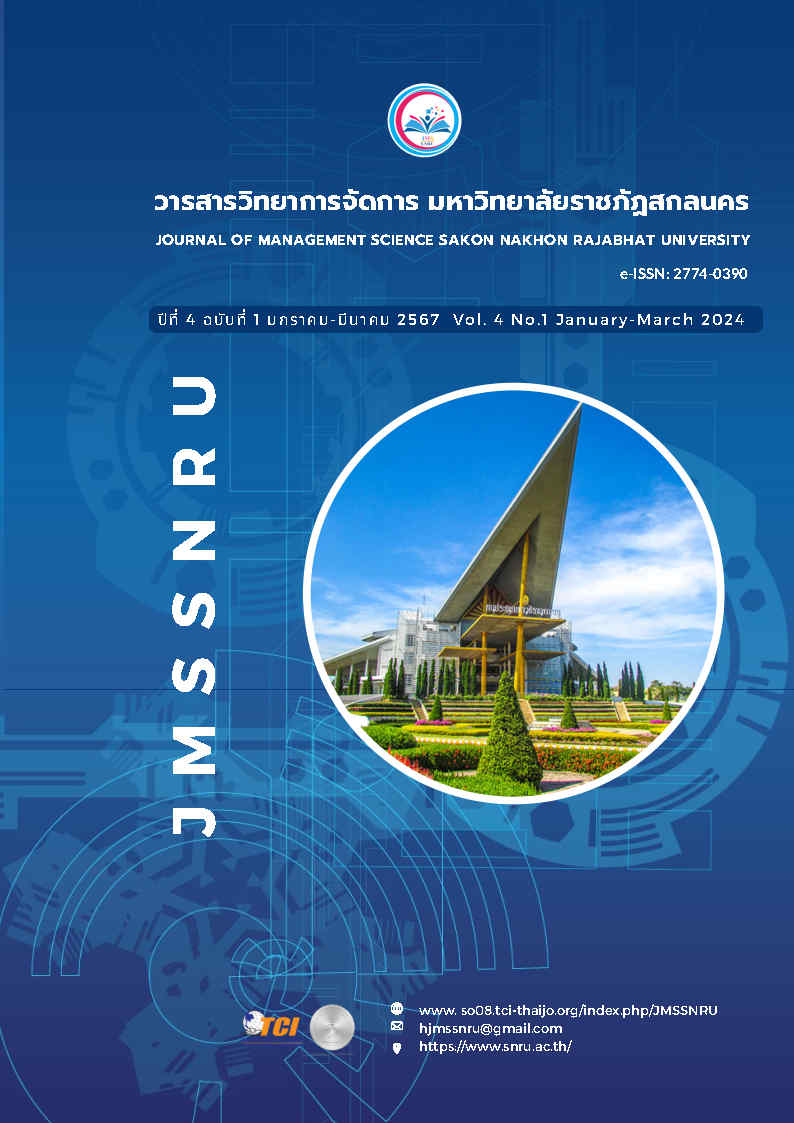EDUCATION-BASED INTERGENERATIONAL PROJECT FOR THAI ELDERLY'S SOCIAL PARTICIPATION ACTIVITIES
Keywords:
Intergenerational education program, Social engagement, Thai elderlyAbstract
The increasing of the elderly population in worldwide is both an opportunity and a challenge for government policies due to the declining workforce as the working-age decreases, while the budgets for elderly health care and pensions are trending upward. In the past, government policies mainly focused on healthcare and social welfare for the elderly people. However, the program recently focuses on employing the potential of the elderly people during their retirement, This program is the combination of 2 concepts: lifelong learning and social capital. Both concepts emphasize the active involvement of the elderly and exchange experiences and knowledge among people in different age groups. Thailand's experience with intergenerational learning programs indicates the importance of creating spaces and opportunities for the elderly to participate. In this context, the elderly serve as sources of knowledge and experience, sharing their wisdom with the younger generation and other members of the community.
References
กองสถิติสังคม สำนักงานสถิติแห่งชาติ กระทรวงดิจิทัลเพื่อเศรษฐกิจและสังคม. (2565). การสำรวจประชากรสูงอายุ ในประเทศไทย พ.ศ. 2564. กรุงเทพฯ: สำนักงานสถิติแห่งชาติ.
จินตนา จันทร์บำรุง. (2564). ส่องสถานการณ์ครอบครัวไทย ปี64 โควิดซ้ำเติม!! สารพัดปัญหาถาโถม. มติชนออนไลน์ 13 เมษายน 2564. สืบค้น 24 มิถุนายน 2566 จาก https://www.matichon.co.th/lifestyle/social-women/news_2671747.
จิราพร เกศพิชญวัฒนา และภัทรพร คงบุญ. (2563). โครงการศึกษานโยบายและการดําเนินงานการป้องกันการหกล้มในผู้สูงอายุในประเทศไทย. รายงานวิจัย มูลนิธิสถาบันวิจัยและพัฒนาผู้สูงอายุไทย (มส.ผส.) สำนักงานการวิจัยแห่งชาติ (วช.).
ชามาภัทร สิทธิอํานวย, พิณสุดา สิริธรังศรี, และอุทัย บุญประเสริฐ. (2562). รูปแบบการส่งเสริมการจัดการเรียนรู้ระหว่างวัยของผู้สูงอายุและเด็กในสถานศึกษา. ว.มรม., 13,(1), 275-285.
ไทยพับลิก้า. (2018). ศูนย์ดูแลคนสองวัย Intergeneration Center โมเดลเชื่อมสัมพันธ์ต่างรุ่น สร้างคุณภาพชีวิตคนแก่-เด็กเล็ก เรียนรู้ใส่ใจกันและกัน. สืบค้น 4 กรกฎาคม 2566 จาก https://thaipublica.org/2018/05/intergeneration-care-center-aging-preschool/.
พนม คลี่ฉายา. (2563). การใช้เทคโนโลยีดิจิทัลของผู้สูงอายุ และข้อเสนอเพื่อการเสริมสร้างภาวะพฤฒิพลังของผู้สูงอายุไทย. รายงานวิจัย มูลนิธิสถาบันวิจัยและพัฒนาผู้สูงอายุไทยและสำนักงานการวิจัยแห่งชาติ.
มูลนิธิสถาบันวิจัยและพัฒนาผู้สูงอายุไทย. (2565). สถานการณ์ผู้สูงอายุไทย พ.ศ. 2564. นครปฐม: สถาบันวิจัย ประชากรและสังคม มหาวิทยาลัยมหิดล.
มูลนิธิสถาบันวิจัยและพัฒนาผู้สูงอายุไทย. (2566). เอาชนะภาวะ “เนือยนิ่ง” ด้วย 7 กิจกรรมทางสังคม สร้างความสุขให้ผู้สูงอายุ. สืบค้น 14
มิถุนายน 2566 จาก https://thaitgri.org/?p=39066.
สำนักงานสถิติแห่งชาติ (สสช.). (2564). รายงานสถิติประชากร 2563. สืบค้น 16 มิถุนายน 2566 จาก https://www.nso.go.th/sites/2014/Pages/Populati%0AonStat.aspx
อาชัญญา รัตนอุบลและคณะ. (2561). ข้อเสนอการพัฒนาการดำเนินงานส่งเสริมศักยภาพผู้สูงอายุ. รายงานวิจัย. มูลนิธิสถาบันวิจัยและพัฒนาผู้สูงอายุไทย (มส.ผส.) และสำนักงานคณะกรรมการวิจัยแห่งชาติ (วช.).
อัศนี วันชัย, นันทา พิริยะกุลกิจ และกัลยา ศรีมหันต์. (2563). ประสบการณ์การตัดสินใจเข้าร่วมและไม่เข้าร่วมกิจกรรมชมรมผู้สูงอายุของผู้สูงอายุที่อาศัยอยู่ในเขตเมือง: การวิจัยเชิงคุณภาพ. วารสารพยาบาลสภากาชาดไทย, 13(1), 116-128.
Berkman, L. F., & Syme, S. L. (1979). Social networks, host resistance, and mortality: a nine-year follow-up study
of Alameda County residents. American Journal of Epidemiology, 109(2), 186-204.
Bostrom, A.K. (2007). Informal learning in a formal context: ‘problemzing’ the concept of social capital in a contemporary Swedish context. International Journal of Life Long Education, 21(6), 510–524.
Cornwell, B., Laumann, E. O., & Schumm, L. P. (2008). The Social Connectedness of Older Adults: A National Profile.
American Sociological Review, 73(2), 185-203.
Femia, E. E., Zarit, S. H., Blair, C., & Jarrott, S. E. (2019). Intergenerational programs: An overview and description of current research and practice. The Gerontologist, 59(1), e20-e29.
Hoff, A. (2007). Intergenerational Learning as an Adaptation Strategy in Aging Knowledge Societies. In: European Commission (ed.) Education, Employment, Europe. Warsaw: National Contact Point for Research Programs of the European Union.
Holt-Lunstad, J., Smith, T. B., Baker, M., Harris, T., & Stephenson, D. (2015). Loneliness and Social Isolation as Risk
Factors for Mortality: A Meta-Analytic Review. Perspectives on Psychological Science, 10(2), 227-237.
Morrow-Howell, N., Hinterlong, J., Rozario, P. A., & Tang, F. (2003). Effects of volunteering on the well-being of older adults. Journal of Gerontology: Social Sciences, 58(3), S137-S145.
Peterson, N. A., Speer, P. W., & McMillan, D. W. (2008). Validation of a brief sense of community scale: Confirmation of the principal theory of sense of community. Journal of Community Psychology, 36(1), 61-73.
Smith, J. (2017). Learning Across Generations: An Innovative Approach to Intergenerational Education. Educational
Gerontology, 43(11), 569-579.
United Nations, Department of Economic and Social Affairs, Population Division. (2021). World Population Ageing 2021. Highlights (ST/ESA/SER.A/451).
U.S. Census Bureau. (2020). Social Isolation and Loneliness Among Older Adults. Retrieved from https://www.census.gov/library/stories/2020/05/older-adults-social-isolation.html
Williams, L. (2018). Family Support and Social Participation among Older Adults. The Gerontologist, 58(3), 437-447.
Downloads
Published
How to Cite
Issue
Section
License
Copyright (c) 2024 JOURNAL OF MANAGEMENT SCIENCE SAKON NAKHON RAJABHAT UNIVERSITY

This work is licensed under a Creative Commons Attribution-NonCommercial-ShareAlike 4.0 International License.
An article published in the Journal of Management Science. Sakon Nakhon Rajabhat University is the opinion, copyright and responsibility of the author of the work.







